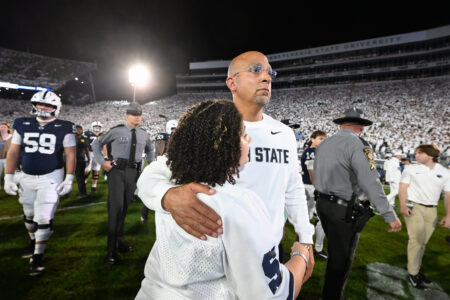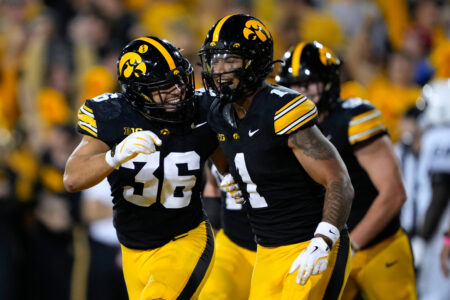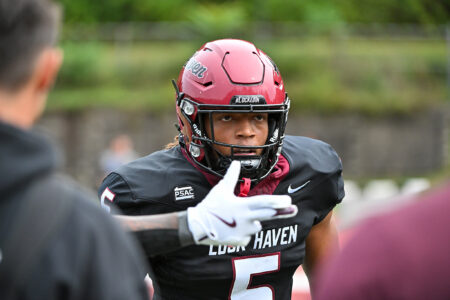Walkin’ the Sidelines: Blame for losses should rarely be individualistic in sports
“We win as a team; we lose as a team.”
That was the message delivered by Phillies manager Rob Thompson to the media in his post-game presser shortly after his team’s gut-wrenching NLDS game 4 loss to the Dodgers in extra innings that eliminated the Phillies from postseason competition. What was Thompson referring to specifically?
With the bases loaded and two outs in the bottom of the 11th inning with the Phillies and Dodgers locked in a 2-2 tie, Phillies hurler, Orion Kerkering induced a weak grounder back to the mound that he initially mishandled before recovering and throwing wildly toward home attempting to get the third out of the inning.
Sadly, for Kerkering, the Phillies and their fans, it was a heartbreaking way to end a season that had the team as one of the favorites to win the World Series. Immediately, as the throw to home sailed past catcher J.T. Realmuto who was clearly pointing toward first base, Kerkering recognized his huge error and immediately bent over with hands on knees in heartbreak.
Yep, an error, a mistake. That is what it was. We all make them.
Sadly, the timing of some mistakes magnifies them to be more significant than others. The timing of Kerkering’s mistake certainly carried huge weight. A simple mistake ended the Phillies season and thus their hopes of a world series crown.
Kerkering walked off the field in obvious mental anguish as he believed his error was the reason for the Phillies loss. That is exactly how many fans saw it too. They immediately began pointing fingers and placing blame. Fortunately, Kerkering had teammates and a manager that had his back.
Was Kerkering solely responsible for the Phillies elimination from the playoffs? Surely not. Did he play a role? He sure did.
So did every other player, manager and coach who wore the powder blue uniforms. Apart from Game 3, in which the Phillies looked like the team that many of us watched for most of the season, they failed to hit.
Many will blame the hitting coach for that. Sorry though, that is on the players.
Many will blame the manager for a decision to bunt at a crucial moment in game two. Was it his decision? Yes. Was it the right one? Maybe or maybe not.
Was the decision that led to a failed attempt to move the runner to third in that situation the reason that the Phillies lost that game? Nope. There were failures by others as well during the game. As Thompson said, “We win as a team, and we lose as a team.”
Things have been topsy turvy in Happy Valley over the course of the past few weeks. Penn State entered the college football season with national championship aspirations and for some even expectations while being ranked No. 2 in pre-season polls. All went according to plan for the most part as they cruised past inferior opponents on their way to a 3 and 0record before hosting Oregon in a nighttime whiteout game.
Head Coach James Franklin has carried with him for a few years now the distinction of not being able to win the big
games. As the Oregon game wore on and the Nittany Lions struggled, you could sense the disgust growing among the PSU fanbase toward Coach Franklin. All the blame was headed toward him.
The Nits would rally in the fourth quarter to tie the score and force two overtimes before an interception by quarterback Drew Allar in the second overtime sealed the Lions’ fate. Another PSU loss in a big game under James Franklin.
The postgame blame game featured both Franklin as well as quarterback Allar. Fans once again ridiculed Franklin for his failure to win the big game and set their sights too on Allar, who was faced with the “he’s no good” moniker.
A week later and on the road against a struggling UCLA team, Franklin’s squad was embarrassed and fell to 3-2. He looked to regroup the Nittany Lions as they returned to Beaver Stadium to face Northwestern. Franklin was greeted by boos from the PSU homecoming crowd.
With every bad play, the tension mounted. PSU, of course, went on to lose to the Wildcats 22-21. As Franklin and his squad exited the stadium, the scene got ugly as he was booed relentlessly and chants of “Fire Franklin” were louder than they had been at any time.
On Sunday, James Franklin was fired as the head football at PSU. Yes, James Franklin has taken the fall for the failures of the Nittany Lions losses. Now, many will surely say, he is the head coach, and he is totally responsible for the failures. I’m not debating that as it is the head coach that most often takes the axe when things go array with a team. I also agree that because things got as ugly as they did that there was no other choice for PSU than to move on from Franklin.
Here is the problem as I see it. Where I have issue with not just the James Franklin situation at Penn State or the Rob Thompson or Orion Kerkering situation in Philadelphia is that none of the three are alone in their team’s failures.
Who else is to blame?
For the Nittany Lions, it’s the school’s administration. It’s the offensive and defensive coordinators as well as the other coaches. Also, we must not forget, it’s the players who ultimately must make plays.
In Philadelphia, it’s everything from the front office to the manager and coaches to the players themselves. It takes a village to raise a child. Likewise, it takes an entire organization to find success at the highest levels of college and professional sports. You win as a team, and you lose as a team. And the team includes the entire organizational structure from top to bottom, from those who sit in offices to those who wear the uniforms.
It has always been and always will be that people will look for scapegoats when teams lose. It will likely always be too that the head coach will be the first to fall. Is that fair? Not in my mind. There are many things and people that go into winning and losing.
In my view, it’s hard to argue that one person is to blame for a team’s success or failure. Likewise, I feel it’s crazy to think that one play and or mistake is to blame for a loss. To think that is the case is simply placing blame and looking for scapegoats and not necessarily looking for what is likely to lead to better outcomes in the future.
Go ahead and point fingers as you see fit. However, it’s not likely to bring about better results. Only a mindset of understanding how to both win and lose as a team can long-term success be expected and achieved.
Another factor to consider when we find it necessary to criticize and blame is the fact that we are blaming human beings. People with families. People with feelings.
Did they sign up for it? Well, they signed up to coach understanding that criticisms could come. However, did they sign up to be berated and have their families be verbally assaulted as well? Doubtful.
As for the players, they are human too. They hit home runs, they steal bases, they make tackles, score touchdowns etc. But they also strikeout, make errors, miss tackles, throw interceptions. Do they try to make mistakes? I think not.
Yes, managers and coaches make money. In some cases, they make a lot of money. Same can be said for players.
Regardless, money doesn’t change the fact that they are humans playing or coaching a game. They have emotions. They have families. Let’s all show respect and have a little compassion for the human side of the equation.
One final point. Never is it ever acceptable to blame a youth or high school player or coach in the public arena for something or things that you deem to be failures on their part. That is not to say that there aren’t times when a change of coach or coaches need to be made.
Rather, the more important issue to remember is that again, they are humans who are playing and or coaching not because they are making any or tons of money but rather for the love of the game. We should all respect that and show just a little compassion.
The same type of compassion that we would want if the shoe was on the other foot.




